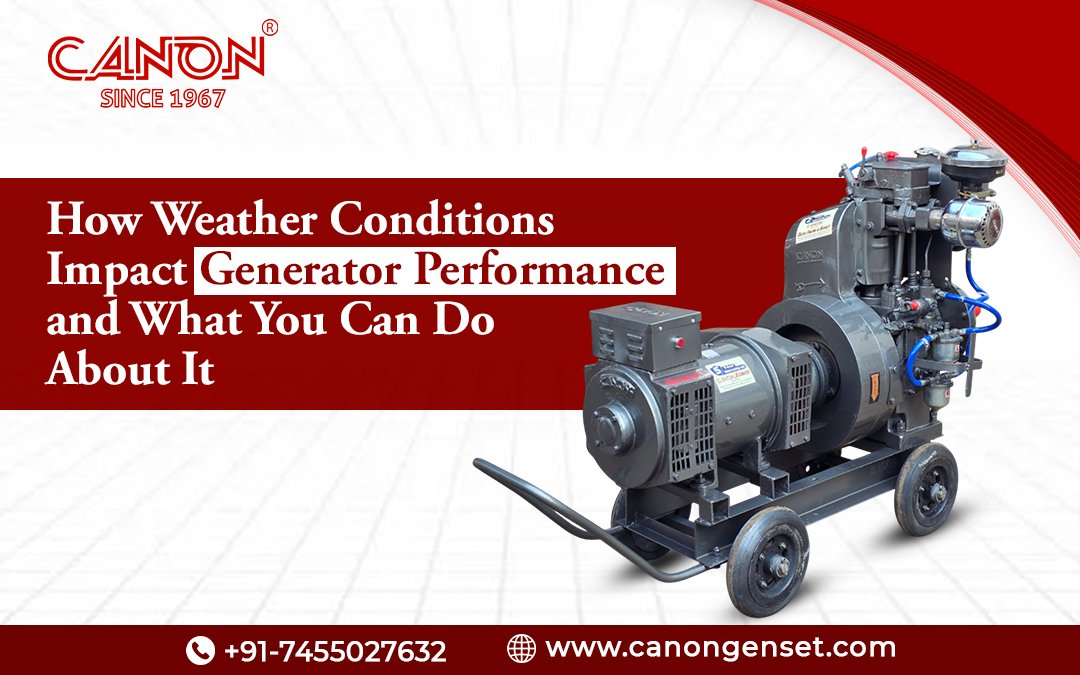Generators are essential for powering industries, households, and emergency operations. Whether you’re relying on them during a power outage or using them to ensure continuous operations at work sites, their reliability is paramount. However, weather conditions can have a significant impact on the performance and longevity of these machines. From extreme heat to cold, weather-related issues can disrupt operations and cause costly damages. In this blog, we’ll explore how different weather conditions affect generator performance and provide practical solutions to mitigate these issues.
1. The Effects of Weather on Generator Performance
1.1 Extreme Heat
High temperatures can put a strain on a generator’s engine. Overheating is one of the most common issues generators face in hot climates. When temperatures rise, the engine’s components, including the coolant and oil, may not function as efficiently, leading to reduced performance and possible damage. Additionally, prolonged exposure to heat can increase wear and tear on engine parts, causing costly repairs. Fuel evaporation is another issue in extreme heat, particularly in gasoline-powered generators, as fuel may evaporate more quickly than usual, reducing fuel efficiency and causing engine problems.
1.2 Freezing Temperatures & Snow
Cold weather presents its own set of challenges. One of the primary issues with winter weather is difficulty starting the generator. Cold temperatures can cause the oil to thicken, making it harder for the engine to turn over. Batteries also tend to lose charge in freezing conditions, which can prevent the generator from starting altogether. Furthermore, thickened fuel may lead to blockages in the fuel lines, making it harder for the engine to receive the necessary fuel to run. Ice accumulation around the generator, particularly around the exhaust and ventilation systems, can also limit airflow and performance.
1.3 Heavy Rain & Humidity
Rain and high humidity levels can be detrimental to generator performance. Water ingress is one of the most significant concerns, as it can cause electrical malfunctions or short circuits. Prolonged exposure to moisture can lead to corrosion of metal components, reducing the generator’s lifespan. Moreover, wet conditions can lead to power failures if the generator isn’t properly protected. Even with weather-resistant features, excessive moisture can compromise the overall functioning of the system.
1.4 High Winds & Storms
Generators exposed to high winds and storms are vulnerable to physical damage. Flying debris can cause dents or break parts, affecting the machine’s ability to function correctly. Additionally, when storms cause power outages, the demand for backup generators surges, which may lead to an overload situation. Dust and debris stirred up by the wind can contaminate the fuel, further reducing efficiency and leading to clogging or engine failures.
1.5 High Altitudes & Low Oxygen Levels
At higher altitudes, oxygen levels decrease, which can reduce engine power. As the oxygen in the air becomes thinner, the engine may struggle to maintain the same level of output. Some generators may require altitude adjustments to the fuel-to-air mixture to optimize performance in these conditions. Without these adjustments, your generator may operate inefficiently or fail to start at all.
2. Preventative Measures to Protect Your Generator
2.1 Regular Maintenance Checks
Routine maintenance is the best way to ensure your generator operates smoothly, especially when exposed to varying weather conditions. Regularly check fuel, oil, and coolant levels, and inspect for any signs of wear, corrosion, or leaks. Changing the oil and replacing air filters periodically can significantly increase the lifespan of your generator and prevent unexpected failures.
2.2 Proper Storage and Placement
The location of your generator is crucial in protecting it from the elements. Store your generator in a dry, well-ventilated area to prevent moisture buildup and overheating. Consider using weather-resistant covers or enclosures that shield the generator from extreme weather while still allowing for proper ventilation. Additionally, placing the generator on a flat, stable surface will help it operate efficiently, even during strong winds.
2.3 Using Cold Weather Kits
For colder climates, invest in cold weather kits, which are designed to keep your generator in optimal working condition during freezing temperatures. Installing battery warmers and engine block heaters can help prevent cold-weather-related starting issues. Additionally, choosing the right fuel type, such as winterized diesel, can prevent fuel from thickening and causing blockages in the system.
2.4 Ventilation and Cooling Strategies
In hot weather, ensure that your generator has proper ventilation to prevent overheating. Check that air vents are clear of debris and that the exhaust system is not blocked. If your generator is still prone to overheating, consider installing additional cooling systems, such as external fans, to help maintain a safe operating temperature.
2.5 Protection Against Moisture and Water Damage
To prevent water damage, always use waterproof covers or enclosures, especially if the generator will be exposed to heavy rain or snow. If possible, elevate your generator to avoid flooding during storms. Elevated placement also helps protect against water seepage and corrosion over time.
3. Emergency Preparedness Tips
Preparation is key to ensuring that your generator remains reliable when you need it most. Here are a few essential tips to consider:
- Keep Spare Fuel and Maintenance Tools: Always store extra fuel, spark plugs, oil, and other essential tools so you can quickly address any issues that arise.
- Test Your Generator Regularly: Perform routine tests to ensure that your generator works efficiently before facing severe weather. Regularly running the generator for a few minutes helps identify potential issues early.
- Have a Backup Plan: If you rely on a generator for critical tasks, always have a backup plan in place in case your primary generator fails. This could mean having a secondary generator available or a service provider you can contact for repairs.
Conclusion
Weather conditions can significantly impact the performance of your generator, but with the right preventative measures and proper maintenance, you can reduce the risks and ensure its longevity. From extreme heat to cold, each weather condition requires specific attention to ensure your generator operates smoothly when needed. Be proactive by conducting regular checks, protecting your generator from moisture, and making adjustments for extreme weather conditions. If you’re unsure about the best way to prepare your generator for your local weather, consult with a professional for advanced solutions. By staying ahead of weather-related challenges, you’ll keep your generator running at its best, ensuring reliable power for all your needs.




Recent Comments